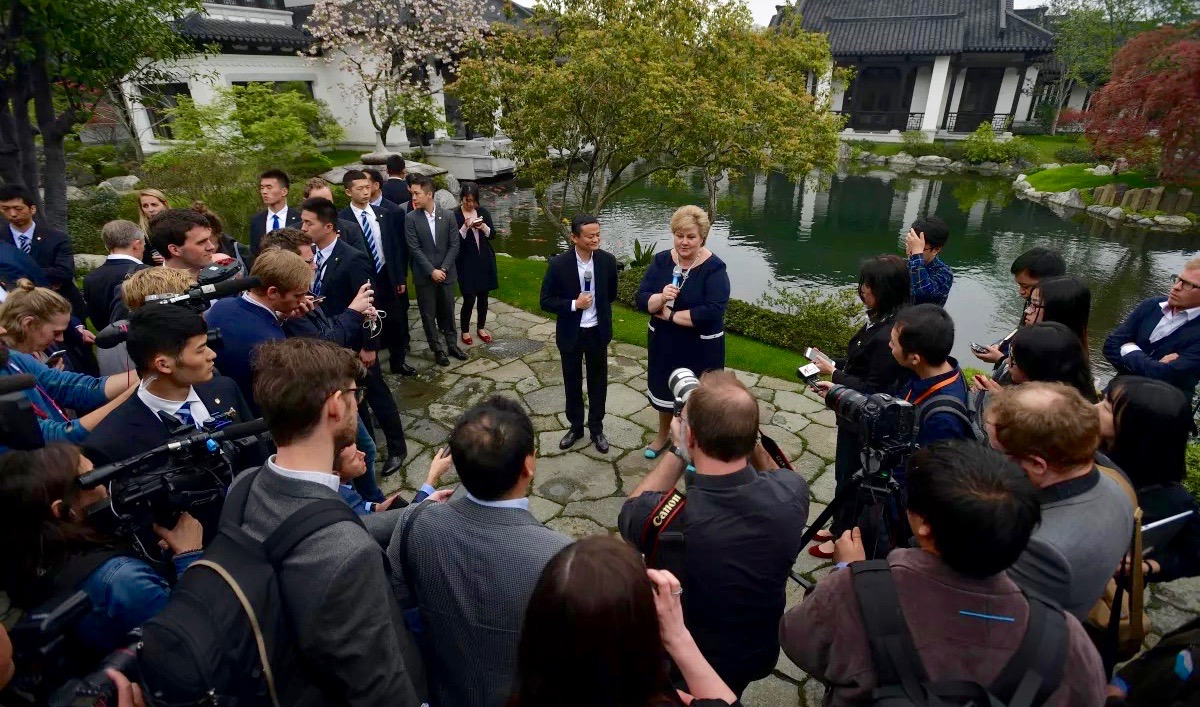
Norwegian Prime Minister Erna Solberg visited Alibaba Group headquarters in Hangzhou, China, on Sunday to discuss the United Nations’ Sustainable Development Goals with company founder and Executive Chairman Jack Ma.
As part of the UN’s larger 2030 Agenda for Sustainable Development, 17 Sustainable Development Goals (SDGs)were launched last year in categories spanning education and environmental protection to hunger eradication and job creation. Through these goals, theUN and its public and private sector partners havemade a long-term commitment to combat poverty, inequality and climate change.
Both Solberg and Ma are among a group of 17 SDG Advocates for the UN that were appointed by former Secretary-General Ban Ki-moon last June. Solberg and Ghanaian President John Dramani Mahama co-chair the group, which also includes Unilever CEO Paul Polman, American economist Jeffrey Sachs and soccer superstar Lionel Messi, among others.
During today’s event, Solberg said that to reach the sustainable development goals, partnerships were needed among business and government officials, the UN bodies and NGOs. “It’s an understanding that the power of change is not just about politics and about organizations. It’s also about how business is done,” she said.
Alibaba highlighted many of the ways in which it has incorporated sustainable development into its own businesses. For the logistics-focused Cainiao Network, that meant using “smart routing” to save fuel on deliveries in 20 Chinese cities, cutting gas usage by 30 percent. Cainiao also uses renewable packaging materials and practices “smart packing” to increase efficiencies in shipping, with the latter leading to a 5 percent drop in the number of boxes used and 3.24 million trees saved. In addition, the company has launched a packaging recycling effort on 1,000 university campuses, as young people are among China’s top users of e-commerce.
These initiatives are part of the “Go Green Campaign,” a project between Cainiao and 32 industry partners that seeks to cut 3.5 million tons of carbon emissions by 2020 while also replacing 50 percent of its e-commerce packaging with biodegradable materials. The Cainiao Green AllianceFoundation, formed last month with six leading logistics providers in China, will put about $40 million towardsimilar initiatives in the area of “green logistics.”
Alibaba affiliate company Ant Financial, meanwhile, is leveraging its 500 million global users to fight climate change. The company’s widely used mobile app links sustainable activities related to internet banking and mobile payments to positive reinforcement in the form of games. Users of “Ant Forest” receive “green power,” a kind of point system, when they pay their utility bills through the app rather than receiving paper bills or choose digital receipts over hard copies. After collecting a certain amount of green power, Ant Financial will plant a tree on behalf of the user. Since starting last August, 200 million people have taken part in Ant Forest and the program is currently reducing carbon emissions by 2,500 tons a day, the company said.
In education, the Jack Ma Foundation, Ma’s personal philanthropic arm, has so far awarded 200 teachers and 40 headmasters in China’s rural countryside with increased training and greater resources in order to improve the quality and access that students there have to quality schooling.
Alibaba also pointed to its support of women throughout the company, as 40 percent of employee promotions among senior managers last year were of women. Also, a third of the Alibaba Partnership, the 36-member decision-making body, are women, as are 47 percentof the company’s total staff. Meanwhile, an additional initiative on the environmental front is the Paradise Foundation, a joint effort between Ma and Tencent CEO Pony Ma. The foundation, which tackles environmental degradation by setting up nature reserves in China, has set a goal of protecting 1 percent of the country’s total land area.
“We think business and philanthropy should always go together,” Ma said, adding at another point during the event, “We believe every social responsibility should be built into the business model.”
In addition to his work on the sustainable development goals, Ma is also a special advisor on trade and entrepreneurship to the UN Conference on Trade and Development, and will participate in UNCTAD’s E-Commerce Week in Geneva at the end of the month.




